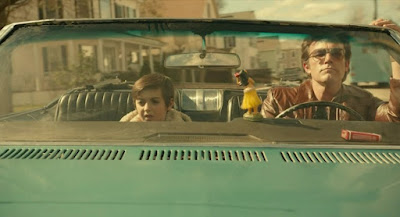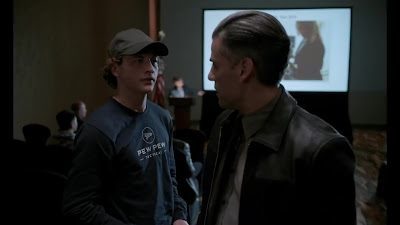or
One Swingin' Dick to Another...
A comedian stands on stage and says "So, a termite walks into a saloon and says "Is the bar tender here?" and he waits...
George Clooney's directing career has been hit-or-miss. It's never been very consistent, except for the love of details, decor, quality...in words and pictures. After a disastrous run of films soon after leaving his television career, there was a period where Clooney paused and re-considered (rather than merely considered) roles being offered to him, resisting the urge—as the late Betty White observed—to act like a feral cat, consuming whatever was available, in the concern that the supply would run out. Tent-pole films were out, as they could be compromised by locked-in release dates. Directors were important, and not just "flavor-of-the-moment" directors studios were pimping. Scripts had to have the spine to be improved, rather than good box-office "buzz." Clooney wanted less time in the trailer and more time learning the craft, and started directing only when he found a project with enough of a chance to work—a long-languishing Charlie Kaufman script, based on Chuck Barris' highly questionable memoir. Confessions of a Dangerous Mind put Clooney on the directing map, and his next film Good Night, and Good Luck. established his cred as a "serious" director. This was no stunt. Clooney wanted to make good films and good art. To that end, Clooney started swinging for the fences than easy lay-ups.
The results have been mixed. But, with The Tender Bar, he's established a new high-mark for his efforts. Based on J.R. Moehringer's memoir, with a script by William Monahan (the first script of his I've liked!), it's a coming of age story of how a village takes care of their own. JR (played by Daniel Ranieri in the early years) and his Mom (Lily Rabe) make another return to the house of her father (Christopher Lloyd) after being kicked out of her place for being behind on the rent five months. This is not looked upon kindly by the residents who include three generations of family, none of whom have fled the nest. To Mom, it looks like failure. To JR, it looks like family.
JR's father is merely referred to as "The Voice"—a radio bum who got Mom pregnant and had no designs on anything post-ejaculation. This produces the first words of advice from JR's Uncle Charlie (Ben Affleck, developing an Al Pacino growl) "He's just an asshole who happens to be on the radio. Don't look for your father to save you. And don't play sports (you're no any good at it). That's all I have to say. The game is five card stud." And as Uncle Charlie has assured JR "I'll always tell you the truth," JR has to believe him. Still, he listens to his father's voice on the radio as if it was His Master. It is only when the father starts breaking promises that JR takes Charlie's advice.
Charlie runs the Dickens Bar down the road, dive for a regular crowd of pack-rats of which Charlie is the Master of Ceremonies and Obedient Servant. "When you're eleven years old," says JR "You need an Uncle Charlie." Especially, when wisdom is so casually dispensed—you've got to know "how to change a tire...jump a car" and tangentially "never hit a woman even if she stabs you with scissors." He encourages him to read, opening up his closet full of books to him, inspiring JR to become a writer.
But, single Mom wants him to be a lawyer and go to Yale. It seems impossible, but JR stays on track and when he's a young man (played by Tye Sheridan), he's off to New Haven to chart his own course, with several detours along the way, including a romance with a girl (Briana Middleton) that throws him right off the road.
The reviews have been mixed, but I owe that to post-Trump cynicism, where when someone tells you they'll tell you the truth, you can't believe they'd actually do it. Maybe it has something to do with professional jealousy as Moehringer's won a Pulitzer. I don't know. All I know is, at this point in time when a lot of people are moving back home, it is a nostalgic look at when America had such a thing as a community, instead of dwellings standing in for bunkers.
The reviews have been mixed, but I owe that to post-Trump cynicism, where when someone tells you they'll tell you the truth, you can't believe they'd actually do it. Maybe it has something to do with professional jealousy as Moehringer's won a Pulitzer. I don't know. All I know is, at this point in time when a lot of people are moving back home, it is a nostalgic look at when America had such a thing as a community, instead of dwellings standing in for bunkers.
Clooney has always had a nostalgic streak—his contemporary work can be a little nasty and his one futuristic one had no hope at all. But, here, principles are still intact, his dialog crackles quickly (when it's not overlapping) and the pauses are deftly comic. And the director is less concerned with locked-down formalism as with an economy of footage, that still takes the time for the important interplay of looks between people—or more importantly, not looking. And despite the incessant cursing, it's concerned with civility...and learning about it and recognizing it, no matter what class it originates in.
There are no big issues underpinning the story, other than the origins of respect and grace, personal attributes that have shown up in the director's other movies that give them their air of being old-fashioned and principled. This one is less of a sermon, more of a demonstration. It makes its points softer and less obtrusively, and for some reason that reflects an attitude of more respect towards the audience, maybe because self-respect is so inherent a theme of it that it reflects back.
It makes it less a coming of age story, than one of the coming of wisdom.











































